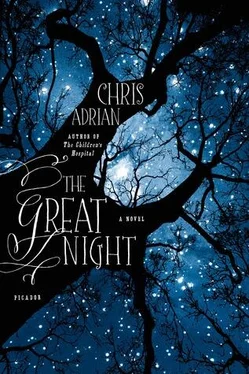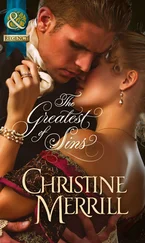“Hi,” he said.
“The lesson of this house,” Mike said to him in front of the tree, “is that forgetting is perilous. We who live here never forget what happened under the hill, though we don’t entirely remember, either; nobody has the specifics, you see. But now look what you’ve brought us — a reminder!”
“But I don’t remember,” Henry said, which was mostly true. He had his first name, but not his last, and he had some brief scenes involving the creature who had taken him from his family, but not the whole story of what had happened with him, and when he closed his eyes he could see the faces of his parents and his sister, but he didn’t know their names. He didn’t know where he had lived before he came to San Francisco. He didn’t even remember his birthday. He told that to Mike.
“It will come. In the meantime you’ll just have to live as if every day is your birthday. Happy birthday, Henry Whoozie. Happy birthday!” He picked him up and carried him around the garden, singing “Happy Birthday” to him. Then he took him inside where the other boys were seated on and at a long table in the kitchen, having cereal and cookies and, here and there, a beer for breakfast. “It’s his birthday, boys!” Mike shouted. “Sing him a song!” They put down their bottles and spoons and joined in enthusiastically, but the bored look in Peaches’s eyes made Henry think they did this for everybody on their second day.
Ryan took Henry to the basement to pick out a bicycle. He had already split his clothes with him, because of all the boys they were about the same size, and Henry had his own “Mike’s Messengers” T-shirt, which he would wear while he was working. “Everybody works,” Ryan said. “Some harder than others, but we all ride. You and me, we should only be working when school’s out.”
“We go to school?” Henry asked.
“Fuck no,” Ryan said. “Or not like you think. But we can’t be out on the street when the cops think we should be in school.”
The basement was not just full of bicycles. There were piles of newspapers and old magazines, and decaying papier-mâché sculptures of animals attacking each other, and canvases stacked face down up to Henry’s shoulder. Henry lifted one up and could just make out the contents: a painting of the park surrounded by fog. Ryan pushed it down. “Those are Mike’s,” he said. Henry followed him, passing through a room piled up with what Henry thought at first was exercise equipment until he got a closer look: there was a wooden post as thick as he was and twice as tall, with a pair of manacles dangling from it, and a couple of wooden tables, and a toilet seat strung on a wicker chair but not actually attached to a toilet, an iron cage big enough to hold three or four large dogs, and a set of stocks, like the Pilgrims used to have in their town squares. Henry suddenly remembered getting his picture taken in a pair of those, in Williamsburg, and he remembered very clearly that he had only been visiting Williamsburg. That wasn’t where he was from.
“Do people get punished down here for something?” he asked.
“Belonged to the previous owner of the house,” Ryan said. “Weirdos. I can get out of that cage in ten seconds, though, and the stocks in thirty. Here you go.” They had come to the bicycles, lined up in a rack as long as the whole wall. There was every sort of bicycle there that Henry could think of, ten-speeds and motocross and beach bikes and even a little purple-framed girls’ bike with a bright yellow banana seat and tassels on the handlebars. A little license plate on that one said, LORRAINE. “Mike says the bike chooses you. You close your eyes and touch them and you know when it’s one that wants you. But it’s not always sized right when you do that.” Henry closed his eyes and ran his hand along the bicycles, touching fenders and tires and seats. He felt nothing the first time he went down the row, but when he had come halfway back there was a feeling like his hand was immersed in flowing water, and the texture of the wheel he was touching felt suddenly different.
“I think I found it,” he said, and opened his eyes. There was a little pony staring up and breathing softly at him where the bicycle had been. His hand was placed high up on its nose, just between its eyes. It huffed and changed back into a bicycle. Henry stepped back, feeling both alarmed and somehow reassured at the change: it was at the same time one of the strangest and most ordinary things he’d ever seen. He and Ryan both stared at the bike, a little green ten-speed that had seen better days, but it didn’t change again.
“Well,” Ryan said. “ That’s never happened before.”
The black dog led Henry out of the hotel and up the street to catch a streetcar. It stopped for them, but nobody looked at them when they got on board, and the driver didn’t ask them for a fare. The dog sat quietly as the train trundled up Market Street, so Henry did the same. He wasn’t inclined at all to ask lots of questions about where they were going or ask the homeless person sitting in front of them for help or to run away. All he could think of was how nice it was to ride on the streetcar and how pretty the rain was against the windows and how lovely the neon looked reflected in puddles outside the run-down theaters they passed. The homeless woman in front of them had bugs in her hair, flat gray lice the size of pencil tips that crawled in loops all over her head. Henry imagined that they were in a circus, doing tricks on and under the lady’s big filthy top. He leaned forward to watch more closely. The dog stood up. They had come to the last stop, near the corner of Market and Castro streets.
It was one-thirty in the morning, but Castro Street was pretty crowded: there were men holding hands, men in pants but no shirts, or shirts and no pants, men dressed like women or space aliens, and men dressed like men but carrying dainty parasols instead of umbrellas. Henry stared at them, but none of them stared back.
They crossed Market Street and climbed up the hill, away from the crowd. Henry looked back as they went, then stopped altogether. “Say goodbye,” the dog said.
“Huh?” Henry said, but the dog only pulled on his hand with his mouth and led him on, higher up the hill, which grew so steep eventually that there were steps cut into the sidewalk. Henry wanted to go up them on all fours like the dog. They climbed past houses that got fancier and fancier as they went higher. The wind shifted and Henry could smell the trees just before they came into view over the crest of the hill. “They smell like soap,” he said, because his sister kept eucalyptus shampoo in the bathroom they shared at home. It occurred to him that his sister was going to wonder where he was. “Wait a minute,” he said, as the dog tried to pull him up the stairs into the park. “What’s your name?”
“I have many names,” the dog replied. “You can call me whatever you want.” Henry was standing in the streetlight, but the dog was standing in shadow, and Henry could hardly see him at all. His own arm seemed to disappear where it entered the shadow.
“I think I want to go home,” Henry said.
“But you are home,” the dog replied, and pulled him along up the stairs. Henry did not exactly resist, because he wanted to follow the dog into the darkness under the trees as much as he didn’t want to follow him. The part of him that didn’t want to follow was just starting to pull away, and he was thinking of how much his parents would worry when they woke and found him missing, when he heard a lovely noise of bells. They were walking on a winding path, not entirely alone; Henry could see the glowing tips of cigarettes gliding through the dark on other paths to his left and to his right.
Читать дальше












